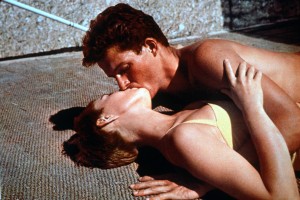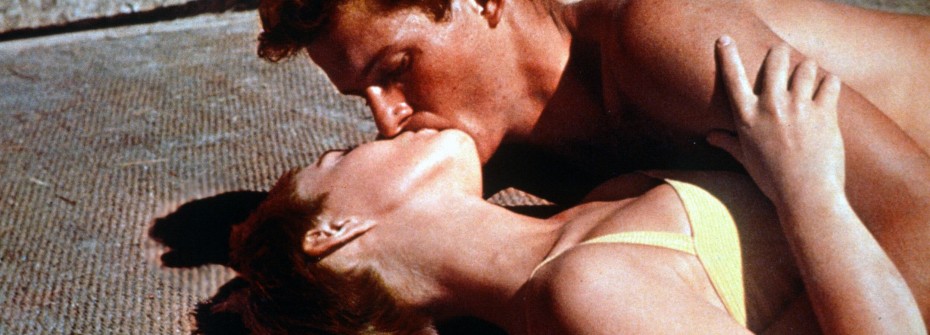‘Bonjour Tristesse’ finds lovers enjoying the French Riviera

Otto Preminger’s Bonjour Tristesse, currently playing New York City’s Film Forum, is a strange time capsule from the late 1950s. It features a hallmark performance from David Niven, a grating performance from Mylène Demongeot, lush imagery of the French Riviera and surprisingly not much humor. Taken together, this odd, odd cocktail is a few ingredients short of a martini.
Niven plays Raymond, a playboy with his eyes set on just about any woman with long legs. His latest fling is Elsa (Demongeot), a blonde bombshell who enjoys soaking in the sun at Raymond’s Mediterranean estate. The young girl brings the older man a sense of youth and vitality. But it doesn’t take long for Raymond’s wandering eyes to stray once again. This time, he falls for Anne Larson (Deborah Kerr), a fashion designer who’s a little older than Elsa, but no less attractive. The central dilemma is whether Raymond should choose an older or younger mate.
Complicating matters is Cecile (Jean Seberg), Raymond’s attractive daughter who similarly flits around the estate, trying to keep away from her college studies and bask in the French sun. The relationship between father and daughter is peculiarly close. The first few scenes of Bonjour Tristesse will have viewers thinking these two are actually a couple, but Cecile and Raymond are merely kindred spirits, two people brought together over their love of the relaxed life.
Besides Niven’s spot-on acting (some believe this is his best role), Preminger’s direction is the highlight of the film. He is able to capture the coastline in such marvelously beautiful ways that the movie feels like an art piece come to life. The sun drips into the sea, while the ladies bathe themselves on the rocks. Interestingly, all of the scenes in the present take place in a black-and-white Paris, while the colorful beach sequences represent the past. We’re led to believe that Raymond and Cecile were much happier at one point, but they have now sunken into a depression. Something has occurred, something dark to forever shade over the sun.
The acting is uneven, with Niven and Kerr the best. Seberg is a little too childish, which could feel appropriate for the role, but here it comes off as pushed and untrue. Demongeot, a native French speaker forced to work her way through the English language, couldn’t be more annoying. She looks absolutely stunning in her dresses and bathing suits, but her dialogue is unfortunately best left unsaid. It’s a wonder why Raymond can’t decide between these two women. Anne is so stately and interesting, while Elsa is difficult to bear for too long.
The script by Arthur Laurents does an amiable job of adapting Françoise Sagan’s original text. At the conclusion of every scene, we’re invited to look deeper into the goings-on of Raymond and Cecile, but the resulting images are rather depthless. Bonjour Tristesse gives the impression of thoughtful cinema, but other than beautiful women and picturesque landscapes, the movie leaves the audience wanting for more. Or, maybe that’s just enough.
By John Soltes / Publisher / John@HollywoodSoapbox.com
-
Bonjour Tristesse
-
1958
-
Directed by Otto Preminger
-
Written by Arthur Laurents; based on the book by Françoise Sagan
-
Starring Jean Seberg, David Niven, Deborah Kerr and Mylène Demongeot
-
Running time: 94 minutes
-
Rating:





